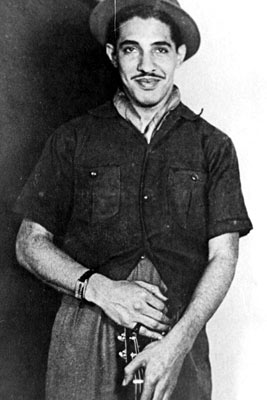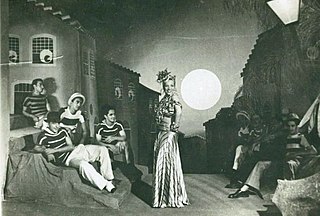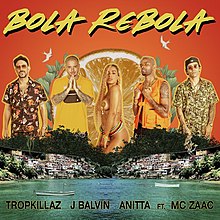
Samba is a name or prefix used for several rhythmic variants, such as samba urbano carioca, samba de roda, recognized as part of the Intangible Cultural Heritage of Humanity by UNESCO, amongst many other forms of samba, mostly originated in the Rio de Janeiro and Bahia states.

Maria do Carmo Miranda da Cunha, known professionally as Carmen Miranda, was a Portuguese-born Brazilian singer, dancer, and actress. Nicknamed "The Brazilian Bombshell", she was known for her signature fruit hat outfit that she wore in her American films. As a young woman, she designed hats in a boutique before making her first recordings with composer Josué de Barros in 1929. Miranda's 1930 recording of "Taí ", written by Joubert de Carvalho, catapulted her to stardom in Brazil as the foremost interpreter of samba.

The music of Brazil encompasses various regional musical styles influenced by European, American, African and Amerindian forms. Brazilian music developed some unique and original styles such as forró, repente, coco de roda, axé, sertanejo, samba, bossa nova, MPB, gaucho music, pagode, tropicália, choro, maracatu, embolada, frevo, brega, modinha and Brazilian versions of foreign musical styles, such as rock, pop music, soul, hip-hop, disco music, country music, ambient, industrial and psychedelic music, rap, classical music, fado, and gospel.
Tropicália, also known as tropicalismo, was a Brazilian artistic movement that arose in the late 1960s. It was characterized by the amalgamation of Brazilian genres—notably the union of the popular and the avant-garde, as well as the melding of Brazilian tradition and foreign traditions and styles. Today, tropicália is chiefly associated with the musical faction of the movement, which merged Brazilian and African rhythms with British and American psychedelia and pop rock. The movement also included works of film, theatre, and poetry.

Dorival Caymmi was a Brazilian singer, songwriter, actor, and painter active for more than 70 years, beginning in 1933. He contributed to the birth of Brazil's bossa nova movement, and several of his samba pieces, such as "Samba da Minha Terra", "Doralice" and "Saudade da Bahia", have become staples of música popular brasileira (MPB). Equally notable are his ballads celebrating the fishermen and women of Bahia, including "Promessa de Pescador", "O Que É Que a Baiana Tem?", and "Milagre". Caymmi composed about 100 songs in his lifetime, and many of his works are now considered to be Brazilian classics. Both Brazilian and non-Brazilian musicians have covered his songs.

Ary Evangelista de Resende Barroso was a Brazilian composer, pianist, soccer commentator, and talent-show host on radio and TV. He was one of Brazil's most successful songwriters in the first half of the 20th century. Barroso also composed many songs for Carmen Miranda during her career.

Week-End in Havana is a 1941 20th Century Fox Technicolor musical film directed by Walter Lang and starring Alice Faye and Carmen Miranda. It was the second of three pictures the two stars made together and the second Faye film to have a Latin-American theme, typical of Fox musicals of the early 1940s. Faye was pregnant during filming.
"I, Yi, Yi, Yi, Yi " is a 1941 song. It was written for the 1941 film That Night in Rio, and was popularized by Carmen Miranda. The lyrics were written by Mack Gordon and the music by Harry Warren.
"Na Baixa do Sapateiro" is a famous Brazilian song, written by Ary Barroso. Its title comes from a street in Salvador, Bahia, where many cobblers once worked. It was originally released in 1938 as the B side to Salada Mista, which did not achieve the same level of success. This first recording was sung by Carmen Miranda with Orchestra Odeon. She never released the song on disc in the United States. The song was originally going to be featured in the Carmen Miranda film Banana da Terra (1939), but was replaced with "O Que É Que A Baiana Tem?", because of the high license fee demanded by Ary Barroso to use his song. However the song has been recorded many other times by a large number of artists. The song gained international fame when it was featured in the Disney film The Three Caballeros (1944).
"Os Quindins de Yayá" is a famous Brazilian song written by the renowned Brazilian songwriter Ary Barroso and first released in 1941. It gained international fame when it was sung by Aurora Miranda in the Disney film The Three Caballeros.

Carmen Miranda: Bananas is My Business is a 1995 documentary filmed and directed by Helena Solberg. This documentary chronicles the life and career of Carmen Miranda, Hollywood's symbol of Latin American spirit in the 1940s. The documentary tells her life story in a series of stages, beginning with her roots and rise to stardom in her home country of Brazil, her transition and development as a performer in the United States, first on Broadway in New York City, then in the film industry after she signed with 20th Century Fox in Los Angeles, and her later years in life, before her death and her return to Brazil. Helena Solberg uses two different film styles, biography and directorial reverie, in which Solberg uses actor Erick Barretos to “resurrect Carmen Miranda in several fantasy sequences. Helena Solberg's attitudes shift throughout the documentary from awe-struck child to empathetic and forgiving Brazilian woman, which she uses to represent the contradictory subplots of Carmen Miranda's life. Alongside the fantasy like resurrection of Miranda, Solberg accompanies her documentary with multiple interviews with Carmen Miranda's friends and family, like her sister, her first boyfriend, the guitarist Laurindo Almeida, samba song-writer Synval Silva, Cesar Romero, and Alice Faye.

Carmen Miranda Museum, located in the Parque Brigadeiro Eduardo Gomes, is a museum established in homage to singer and actress Carmen Miranda and open to the public since 1976. The museum was officially opened on the 21st anniversary of her death.

O que é que a baiana tem? is a song composed by Dorival Caymmi in 1939 and recorded by Carmen Miranda.

"No Tabuleiro da Baiana" is a samba written in 1936 by Ary Barroso and recorded by Carmen Miranda.

The closing ceremony of the 2016 Summer Olympics was held on 21 August 2016 from 20:00 to 22:50 BRT at the Maracanã Stadium, Rio de Janeiro, Brazil.

Aloísio or Aloysio de Oliveira, also known as Louis Oliveira, was a Brazilian record producer, singer, actor and composer. A key figure in the internationalization of Brazilian popular music, he contributed to Carmen Miranda's career abroad with his own musical ensemble: Bando da Lua, which he founded in 1929 with Hélio Jordão Pereira, Afonso Osório, Stênio Osório, Armando Osório, Osvaldo Éboli, Ivo Astolfi, Diego Astolfi and some other cousins of the latter for a total of 12 people. With the death of Miranda in August 1955 the group disbanded. Back in Brazil, Aloísio directed the command of Odeon Records, then created his own record label: the Elenco, producing dozens of discs and launching important names of bossa nova as Tom Jobim.

Carmelita Madriaga, known as Carmen Costa, was a Brazilian singer and composer.

"Bola Rebola" is a song by Brazilian production duo Tropkillaz, Colombian singer J Balvin, and Brazilian singer-songwriter Anitta featuring fellow Brazilian musician MC Zaac. Written alongside Hailey Leane Collier and Jazelle Paris Rodriguez, it was released as a single on 22 February 2019, through Universal Music. Featuring lines in Portuguese, English, and Spanish, the song has been classified by O Globo as a crossover of funk carioca with multiple genres.
Aníbal Augusto Sardinha, known by his professional name, Garoto, was a Brazilian composer and performer on an array of plucked string instruments including the guitar, tenor guitar, 7-string guitar, banjo, cavaco, cavaquinho, and the bandolim. He was also a singer in several of the ensembles in which he performed. An important performer and composer of Brazilian choro, his compositions, influenced by American jazz, anticipated the development of bossa nova. Garoto performed and collaborated with many important musicians, including guitarists Paraguassú, Aimoré, Serelepe, Armando Neves (Armandinho) and Laurindo Almeida, as well as Carmen Miranda and Radamés Gnattali. He also recorded on several labels, including Parlophone (Brazil), Odeon, Continental, and RCA-Victor, and performed on the radio for Rádio Educadora Paulista, Rádio Cosmos, Rádio Cruzeiro do Sul, Rádio Record, Rádio Mayrink Veiga, Rádio Tupi, and Rádio Nacional.













